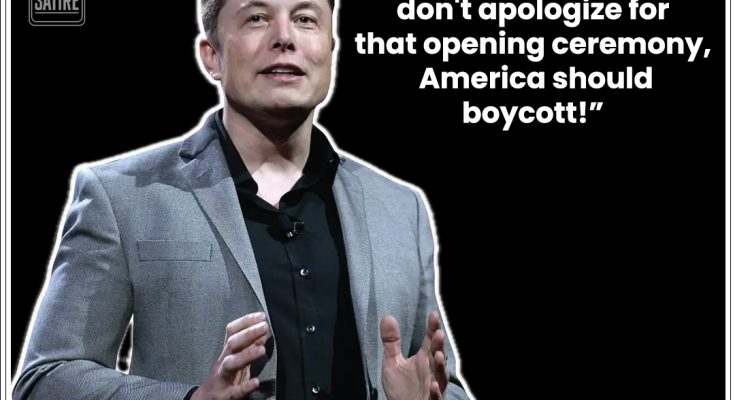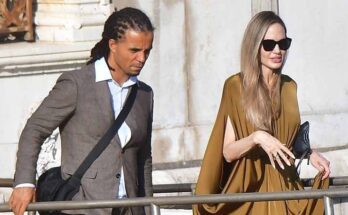The Controversial Ceremony: What Sparked the Outrage?
Subheadline: “If the Olympics Don’t Apologize, America Should Boycott!” Demands Resonate Nationwide
Main Article:
[Washington, D.C.] – A wave of controversy has erupted across the United States following the opening ceremony of the Paris 2024 Olympics, with calls for an American boycott if organizers do not issue a formal apology. The ceremony, which was intended to celebrate global unity and the spirit of competition, has instead sparked a heated debate, leaving many Americans feeling disrespected and demanding action.
The outcry began almost immediately after the ceremony concluded, with social media platforms lighting up with criticism. Many viewers took issue with various elements of the event, interpreting them as offensive or dismissive of American values. The backlash quickly escalated, culminating in a powerful statement that has gained traction across the country: “If the Olympics don’t apologize for that opening ceremony, America should boycott!”
The Controversial Ceremony: What Sparked the Outrage?
The Paris 2024 opening ceremony was a grand spectacle, featuring elaborate performances, cutting-edge technology, and a parade of nations. However, several moments during the ceremony have been singled out as particularly contentious by critics in the U.S.
Some Americans felt that certain artistic performances and symbolic gestures made during the ceremony were politically charged, with undertones that were perceived as anti-American. Specific segments were seen as lacking respect for the U.S. or misrepresenting its role on the world stage. While the ceremony aimed to convey messages of peace and unity, many viewers interpreted it as a thinly veiled critique of American policies and culture.
“That ceremony was a slap in the face to everything we stand for,” said one prominent commentator on a leading news network. “It was supposed to be about celebrating the Olympic spirit, not pushing an agenda that undermines our country.”
A Nation Reacts: Growing Support for a Boycott
The call for a boycott has quickly gained momentum, with politicians, celebrities, and everyday Americans voicing their support for the idea. Many are urging the U.S. Olympic Committee and the federal government to take a strong stance if the International Olympic Committee (IOC) and the Paris organizers do not issue an apology or explanation.
“America deserves better than this,” said Senator John Whitaker, a vocal supporter of the boycott. “If the organizers of the Olympics think they can insult our country on the world stage without consequences, they are sorely mistaken. An apology is the least they can do. If they refuse, then we should seriously consider pulling our athletes from these Games.”
Public figures from across the political spectrum have weighed in on the issue, some advocating for dialogue and understanding, while others push for immediate action. On social media, the hashtag #BoycottOlympics2024 has been trending, reflecting widespread dissatisfaction and the desire for accountability.
The Impact of a Potential Boycott
The prospect of the United States boycotting the Olympics is a serious and complex issue, with far-reaching implications. The last time America boycotted the Olympics was in 1980, during the Moscow Games, in protest of the Soviet invasion of Afghanistan. That decision, while a powerful statement, also had significant consequences for athletes, international relations, and the Olympic movement as a whole.
A boycott in 2024 could have similar repercussions, not only depriving American athletes of the opportunity to compete but also straining diplomatic relations between the U.S., France, and the broader international community. Additionally, it could lead to financial and reputational damage for both the IOC and the Paris organizers.
“There’s a lot at stake here,” said Dr. Emily Carson, an expert in international sports law. “A boycott would be a major escalation and could have lasting effects on global sports diplomacy. However, the U.S. does have the right to take a stand if it feels its national dignity has been compromised.”
What’s Next? Waiting on the IOC’s Response
As pressure mounts, all eyes are on the IOC and the Paris 2024 organizing committee. Will they issue an apology or clarification to address the concerns raised by the American public? Or will they stand by the content of the opening ceremony, potentially leading to further tensions?
The U.S. Olympic Committee has so far remained tight-lipped on the issue, stating only that they are “reviewing the situation and will be in discussions with relevant parties.” Meanwhile, athletes and coaches are caught in a difficult position, uncertain about how the situation will unfold.
“I came here to compete, not to get involved in politics,” said one American athlete who asked to remain anonymous. “But if a boycott happens, it’s something we’ll have to deal with. I just hope it doesn’t come to that.”
Conclusion: A Defining Moment for the Olympics
The controversy surrounding the Paris 2024 opening ceremony has turned what should have been a celebration of global unity into a moment of deep division. As calls for a boycott grow louder, the coming days will be crucial in determining how this issue is resolved.
Will the Olympics, an event meant to bring nations together, instead become a flashpoint for international discord? Or will the situation be defused with an apology and a renewed commitment to the values that the Games are supposed to represent?
For now, the world watches and waits, hoping that a resolution can be found that honors the spirit of the Olympics while addressing the concerns of those who feel wronged.
Editorial:
The Power of Apology: Why the Olympics Must Address the Controversy
The Olympics are more than just a sporting event—they are a symbol of global cooperation and respect. When those values are called into question, it is imperative that the organizers take responsibility and address any missteps. An apology is not a sign of weakness; it is a gesture of goodwill that can help heal divisions and restore faith in the Olympic mission.
Join the Conversation:
Do you support a boycott of the Paris 2024 Olympics? Share your thoughts on social media using #BoycottOlympics2024.
*Stay informed with The Daily Observer for the latest updates on the Paris 2024 Olympics and other breaking news from around the world.




